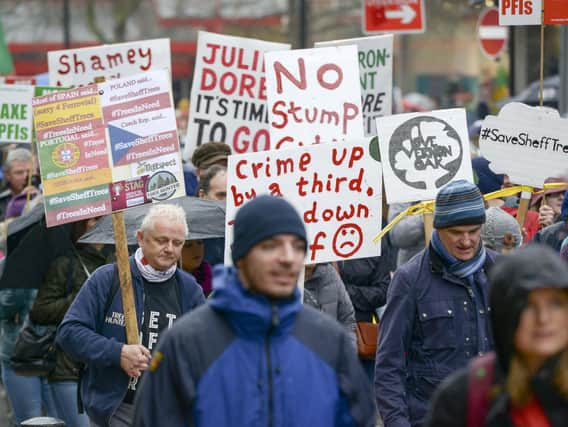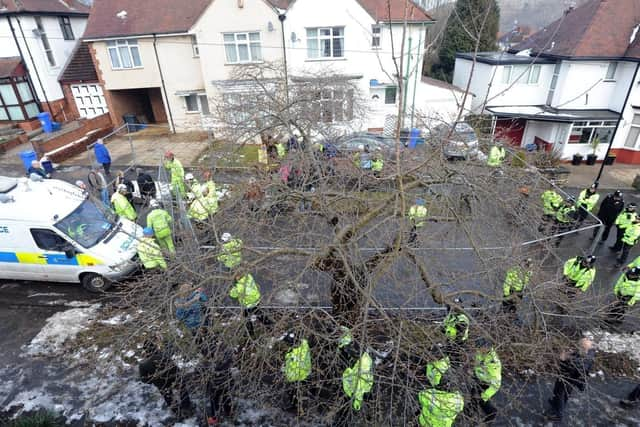Sheffield protesters 'vindicated' after council u-turn on axing 200 trees


In March 2018, work to remove thousands of street trees in the city and replace them with saplings as part of a £2bn highways contract with Amey was put on hold following increasing protests against the strategy and national political condemnation of the use of dozens of police officers and private security guards to support operations.
At that time, around 300 trees earmarked for felling during the first five years of a 25-year contract had still yet to be removed after about 5,700 trees had been axed already. Campaigners argued many healthy trees could have been saved but the council repeatedly said removals were only carried out as a “last resort”.
Advertisement
Hide AdAdvertisement
Hide Ad

But following months of mediated talks with campaigners, a new approach was introduced this year designed to reduce the number of trees being removed through increased use of other solutions such as kerb repairs.
A report going to Sheffield Council’s cabinet next week says 191 of the 309 outstanding trees will now be “retained on a longer term basis”, with 26 requiring “bespoke solutions” to be saved and a further 91 trees awaiting investigation.
So far, just one tree previously listed for felling has now been deemed unsaveable.
Advertisement
Hide AdAdvertisement
Hide AdPaul Brooke, co-chair of Sheffield Tree Action Groups, said the new approach showed it had always been possible to prevent vast numbers of fellings using solutions that were always available within the terms of the contract.
“It is vindication for the campaign, it is exactly what we said to them all along,” he said.
“Over the last few months we have been able to observe Amey workers doing simple highway repairs to a good standard, such as fitting thin kerbs and removing old built up tarmac.
Advertisement
Hide AdAdvertisement
Hide Ad“The announcement that 62 per cent of the 309 trees, that we due to be felled ‘as a last resort’, can now be retained indefinitely is great news but no surprise. It is what we campaigned for.
“We look forward to reviewing the lessons learned and publishing the joint assessments with the council. We are confident this will show that very few healthy trees needed to be felled in order to complete the Streets Ahead road scheme. At some point in the future I have little doubt that we will reflect on how we as a city got this so wrong.”
As part of an agreement reached at the end of the mediated talks, a new Street Tree Strategy for the city is to be developed and the council has announced that Liz Ballard, Chief Executive of Sheffield and Rotherham Wildlife Trust, has now been appointed to the role of independent chair of a group including campaigners and council officials which will oversee the development of the strategy.
Councillor Lewis Dagnall, cabinet member for Environment, Streetscene and Climate Change at Sheffield City Council, said: “In recent months the Council has been working closely with both Amey and representatives of STAG to enable work on the Street Tree Strategy to begin.
Advertisement
Hide AdAdvertisement
Hide Ad“Simultaneously, significant activity has been underway across the city to assess individual trees. As part of this process, a specialist team, made up of tree and highway specialists from Amey, has been exploring possible solutions to retain trees, considering all viable options and often, carrying out suitable remedial works in the same day.
“The availability of alternative solutions funded by Amey, combined with adjustments to the council’s specification around some trees, has allowed us to make significant and positive progress, with the support of all parties.
“I have every confidence that the new group will navigate through what may, at times, be complex matters and arrive at a suitable, and satisfactory, resolution so that we can continue taking positive steps forward.
“Whilst it’s recognised that there are still challenges to overcome, we hope that by continuing to work with stakeholders and affected residents in an open and structured way, we will agree on a long-term solution for the benefit of everyone in the city.”
Advertisement
Hide AdAdvertisement
Hide AdMr Brooke said: “We hope that the development of an exemplary Street Tree Strategy will protect the future of our much needed urban forest and will result in an increase in the street canopy cover with all the health and environmental benefits that brings.”
A Forestry Commission investigation into the legality of the fellings that were carried out which was launched last year is understood to be close to completion.